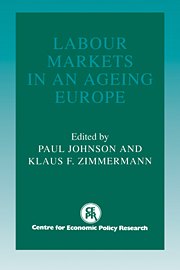Book contents
- Frontmatter
- Contents
- List of figures
- List of tables
- Preface
- List of conference participants
- 1 Ageing and the European labour market: public policy issues
- 2 Ageing and European economic demography
- 3 Ageing and employment trends: a comparative analysis for OECD countries
- 4 Ageing and the labour market in Poland and Eastern Europe
- 5 The implications of cohort size for human capital investment
- 6 Does an ageing labour force call for large adjustments in training or wage policies?
- 7 On ageing and earnings
- 8 Age, wages and education in The Netherlands
- 9 Ageing and unemployment
- 10 Ageing, migration and labour mobility
- Index
2 - Ageing and European economic demography
Published online by Cambridge University Press: 05 November 2011
- Frontmatter
- Contents
- List of figures
- List of tables
- Preface
- List of conference participants
- 1 Ageing and the European labour market: public policy issues
- 2 Ageing and European economic demography
- 3 Ageing and employment trends: a comparative analysis for OECD countries
- 4 Ageing and the labour market in Poland and Eastern Europe
- 5 The implications of cohort size for human capital investment
- 6 Does an ageing labour force call for large adjustments in training or wage policies?
- 7 On ageing and earnings
- 8 Age, wages and education in The Netherlands
- 9 Ageing and unemployment
- 10 Ageing, migration and labour mobility
- Index
Summary
This paper provides an overview of recent and projected demographic developments in Europe in order to establish a context for the more detailed discussion, presented in other papers, of the interaction between the population age structure and the labour market. The first part of this paper reviews data on European fertility and mortality and discusses their joint impact on the evolving age structure of the population. The second section considers whether or to what extent the fertility and mortality patterns are endogenous to the economic system and can be explained by economic factors. The third section then reverses the line of explanation and examines how the performance of the European economies may in the future be conditioned by population pressures.
The ageing of Europe
The population of Europe has been ageing throughout the twentieth century, and this process will continue well beyond the year 2000. Yet the continuity is associated with an important change; whereas ageing in this century has been associated with almost uninterrupted population growth, in the next century ageing will coincide with stagnation and then decline in the total European population. Table 2.1 presents the basic data, as compiled by the United Nations. There is, necessarily, some uncertainty about the future population projections since they are contingent on the accuracy of assumptions about fertility and mortality trends. In this table, medium variant projections have been selected.
- Type
- Chapter
- Information
- Labour Markets in an Ageing Europe , pp. 26 - 52Publisher: Cambridge University PressPrint publication year: 1993
- 6
- Cited by



